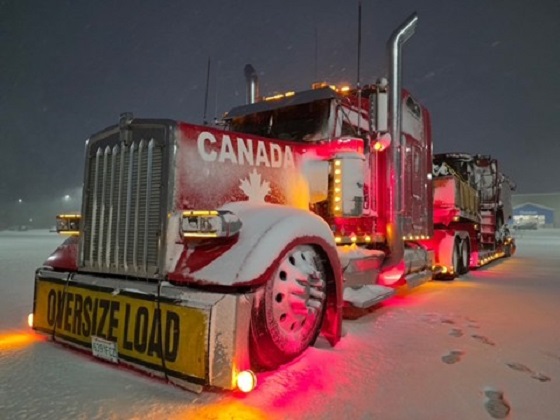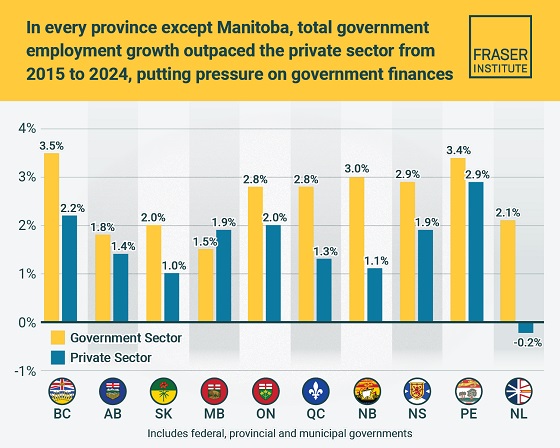Alberta
Province of Alberta reaching out to the rest of Canada for skilled workers

Alberta is calling again
A second Alberta is Calling campaign is launching to attract more skilled workers from across Ontario and Atlantic Canada.
Alberta’s economy continues to grow and diversify, creating rewarding jobs across industries and the province, including in high-demand sectors like skilled trades, health care, food service and hospitality, accounting, engineering and technology. Alberta workers continue to have the highest earnings across all provinces. As more jobs are created, businesses need more skilled workers.
In summer 2022, Alberta’s government launched the Alberta is Calling campaign to help address labour shortages across industries throughout the province. The first campaign targeted Canadians living in Toronto and Vancouver, while this second campaign turns its attention to Canadians living in the Maritimes and parts of Ontario, including London, Hamilton, Windsor and Sudbury.
The campaign highlights Alberta’s economic advantages, including the booming technology and innovation sector as well as offering the highest weekly earnings and lowest taxes in Canada. In addition, the campaign again promotes lifestyle attractions including Calgary, North America’s most liveable city, and access to world-famous mountains and parks for year-round hiking, skiing, biking, and more than 300 days of sunshine per year.
“As Alberta continues to create jobs, attract investment and diversify its economy, we are once again putting out a call for skilled workers to join our great province and appreciate the quality of life that Alberta has to offer. It is the Renewed Alberta Advantage, and I encourage more people to experience it for themselves.”
“Since last summer, nearly 70,000 individuals have moved here, the largest inflow of people we have seen in two decades. Between opportunity and quality of life, Alberta has a fantastic value proposition and the Alberta is Calling campaign has helped to share this message. We look forward to welcoming even more Canadians to Alberta soon.”
“Alberta’s vibrant and diverse restaurant sector is one of the province’s largest employers. However, coming out of the pandemic there are almost 18,000 vacancies in the restaurant sector for vital roles like managers, chefs and prep cooks. That is why Restaurants Canada is pleased to support the relaunched Alberta is Calling campaign.”
“What a great time for people to pursue careers in the trades in Alberta. Women Building Futures supports women seeking new career opportunities to get quality pre-apprenticeship training for exciting careers in the inclusive workplaces WBF Employers of Choice create.”
To learn more about the opportunities and advantages of living in Alberta, visit albertaiscalling.ca.
Quick facts
- The new phase of Alberta is Calling is launching in:
- Atlantic Canada
- St. John’s, N.L.; Charlottetown, P.E.I.; Moncton and Saint John, N.B.; and Halifax, N.S.
- Ontario
- Hamilton, London, Windsor, Sudbury, Sault Ste. Marie, North Bay, Chatham, Timmins and Cornwall
- Atlantic Canada
- In 2022, Alberta saw the highest employment growth in the country.
- Alberta workers continue to have the highest weekly earnings of any provinces, at $1,268 (Statistics Canada, December 2022).
- Alberta families earned a median after-tax income of $104,000 in 2020, which is more than $7,000 higher than Ontario.
- Alberta families generally pay lower personal taxes (for 2022, considering annual family incomes of $75,000, $150,000 and $300,000).
- Alberta saw the highest net interprovincial migration in Canada, at 19,285 people, in the third quarter of 2022.
- According to Alberta’s Short-Term Employment Forecast, high and moderately high-demand occupations include:
- restaurant and food service managers
- software engineers and designers
- web designers and developers
- transport truck drivers
- registered nurses and registered psychiatric nurses
- accounting technicians and bookkeepers
- shippers and receivers
Alberta
New pipeline from Alberta would benefit all Canadians—despite claims from B.C. premier

From the Fraser Institute
The pending Memorandum of Understanding between the Carney government and the Alberta governments will reportedly support a new oil pipeline from Alberta’s oilsands to British Columbia’s tidewater. But B.C. Premier David Eby continues his increasingly strident—and factually challenged—opposition to the whole idea.
Eby’s arguments against a new pipeline are simply illogical and technically incorrect.
First, he argues that any pipeline would pose unmitigated risks to B.C.’s coastal environment, but this is wrong for several reasons. The history of oil transport off of Canada’s coasts is one of incredible safety, whether of Canadian or foreign origin, long predating federal Bill C-48’s tanker ban. New pipelines and additional transport of oil from (and along) B.C. coastal waters is likely very low environmental risk. In the meantime, a regular stream of oil tankers and large fuel-capacity ships have been cruising up and down the B.C. coast between Alaska and U.S. west coast ports for decades with great safety records.
Next, Eby argues that B.C.’s First Nations people oppose any such pipeline and will torpedo energy projects in B.C. But in reality, based on the history of the recently completed Trans Mountain Expansion (TMX) pipeline, First Nations opposition is quite contingent. The TMX project had signed 43 mutual benefit/participation agreements with Indigenous groups along its route by 2018, 33 of which were in B.C. As of March 2023, the project had signed agreements with 81 out of 129 Indigenous community groups along the route worth $657 million, and the project had resulted in more than $4.8 billion in contracts with Indigenous businesses.
Back in 2019, another proposed energy project garnered serious interest among First Nations groups. The First Nations-proposed Eagle Spirit Energy Corridor, aimed to connect Alberta’s oilpatch to a port in Kitimat, B.C. (and ultimately overseas markets) had the buy-in of 35 First Nations groups along the proposed corridor, with equity-sharing agreements floated with 400 others. Energy Spirit, unfortunately, died in regulatory strangulation in the Trudeau government’s revised environmental assessment process, and with the passage of the B.C. tanker ban.
Premier Eby is perfectly free to opine and oppose the very thought of oil pipelines crossing B.C. But the Supreme Court of Canada has already ruled in a case about the TMX pipeline that B.C. does not have the authority to block infrastructure of national importance such as pipelines.
And it’s unreasonable and corrosive to public policy in Canada for leading government figures to adopt positions on important elements of public policy that are simply false, in blatant contradiction to recorded history and fact. Fact—if the energy industry is allowed to move oil reserves to markets other than the United States, this would be in the economic interest of all Canadians including those in B.C.
It must be repeated. Premier Eby’s objections to another Alberta pipeline are rooted in fallacy, not fact, and should be discounted by the federal government as it plans an agreement that would enable a project of national importance.
Alberta
Premier Danielle Smith says attacks on Alberta’s pro-family laws ‘show we’ve succeeded in a lot of ways’

From LifeSiteNews
Recent legislation to dial back ‘woke progressivism’ is intended to protect the rights of parents and children despite opposition from the left.
Alberta Premier Danielle Smith took a shot at “woke progressivism” and detractors of her recent pro-family laws, noting that because wokeness went “too far,” the “dial” has turned in favor of parental rights and “no one” wants their “kid to transition behind their back.”
“We know that things went a little bit too far with woke progressivism on so many fronts and we’re trying to get back to the center, trying to get them back to the middle,” Smith said in a recent video message posted on the ruling United Conservative Party’s (UCP) official X account.
Smith, who has been battling the leftist opposition New Democratic Party (NDP) attacks on her recent pro-family legislation, noted how “we’ve succeeded in a lot of ways.”
“I think we have moved the dial on protecting children and the right of girls and women to participate in sports without having to face born male athletes,” mentioning that the Olympics just announced gender-confused athletes are not allowed to compete in male or female categories.
“I think we’re moving the dial on parental rights to make sure that they know what’s going on with their kids. No one wants their kid to be transitioned behind their back and not know. I mean, it doesn’t matter what your background is, you want to know what’s going on with your child.”
Smith also highlighted how conservatives have “changed the entire energy conversation in the country, we now have we now have more than 70 percent of Canadians saying they believe we should build pipelines, and that we should be an energy superpower.’
As reported by LifeSiteNews, Smith recently said her government will use a rare constitutional tool, the notwithstanding clause, to ensure three bills passed this year – a ban on transgender surgery for minors, stopping men from competing in women’s sports, and protecting kids from extreme aspects of the LGBT agenda – remain law after legal attacks from extremist activists.
Bill 26 was passed in December 2024, amending the Health Act to “prohibit regulated health professionals from performing sex reassignment surgeries on minors.”
Last year, Smith’s government also passed Bill 27, a law banning schools from hiding a child’s pronoun changes at school that will help protect kids from the extreme aspects of the LGBT agenda.
Bill 27 will also empower the education minister to, in effect, stop the spread of extreme forms of pro-LGBT ideology or anything else allowed to be taught in schools via third parties.
Bill 29, which became law last December, bans gender-confused men from competing in women’s sports, the first legislation of its kind in Canada. The law applies to all school boards, universities, and provincial sports organizations.
Alberta’s notwithstanding clause is like all other provinces’ clauses and was a condition Alberta agreed to before it signed onto the nation’s 1982 constitution.
-

 COVID-191 day ago
COVID-191 day agoCrown seeks to punish peaceful protestor Chris Barber by confiscating his family work truck “Big Red”
-

 Agriculture18 hours ago
Agriculture18 hours agoHealth Canada indefinitely pauses plan to sell unlabeled cloned meat after massive public backlash
-

 MAiD2 days ago
MAiD2 days agoHealth Canada suggests MAiD expansion by pre-approving ‘advance requests’
-

 Alberta1 day ago
Alberta1 day agoPremier Danielle Smith says attacks on Alberta’s pro-family laws ‘show we’ve succeeded in a lot of ways’
-

 Indigenous1 day ago
Indigenous1 day agoCanadian mayor promises to ‘vigorously defend’ property owners against aboriginal land grab
-

 Business2 days ago
Business2 days agoTaxpayers paying wages and benefits for 30% of all jobs created over the last 10 years
-

 Health1 day ago
Health1 day agoOrgan donation industry’s redefinitions of death threaten living people
-

 Daily Caller2 days ago
Daily Caller2 days agoEXCLUSIVE: Here’s An Inside Look At The UN’s Disastrous Climate Conference




